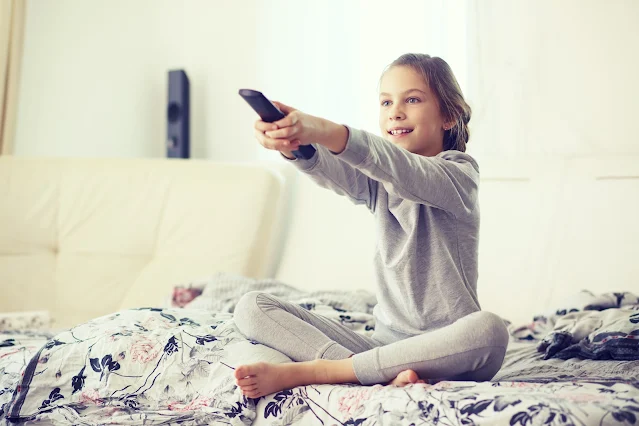Disclosure: This is a collaborative post
In a time where virtual nannies have become an actual ‘thing’, online games on tablets, phones, Nintendos and PlayStations are at an all time high in order to ease the burden on parents who are trying to ‘do it all’, does having a television in a bedroom add to this?
The WHO (world health organisation) recommends no screen time for children under 1, no more than an hour a day for 2-4yr olds, recommending that children sit less and play more with a focus on good quality sleep, with experts recommending switching off screens at least an hour before bed
With this in mind, if a child in the Early Years were to have a TV in their room, the advice would be to use this purely during active waking hours and not as a sleeping aid.
It is also important to remember that although knowledge and experience of technology is important in this day and age, technology for children is not just limited to devices with screens - in fact, Technology within the early years includes lots of different household items which you may not have considered, you can read more about technology for children in this post: Technology in the early years
Reliant recently surveyed 680 parents and found that 45% of children watch TV in order to fall asleep. They also discovered the following:
75% of children want a tv in their room
8% of kids don’t watch tv programmes
50% of children are still watching live tv
43% of parents wish they’d waited to put a tv in their kids room
Kids start asking for tv in infant school
54% of children have an iPad or tablet
So when IS an appropriate age to have a TV in your room?
We know that the early years, before the age of 5yrs old is too soon for a developing brain…but what about later on?
Personally, I have never had a TV in my room. Having suffered from insomnia many years ago during my past career as a professional Headhunter where my brain was always ‘switched on’ - I had to make sure my room was a place that I associated with sleep and rest rather than catching up on TV series or watching the latest films. I very rarely made it through a TV programme on the sofa without falling asleep in an evening though! (Although admittedly this did then lead to strange dreams and nightmares).
There are situations where having a TV in your bedroom is the only option, for those in shared housing or small lodgings with not much space often a bedroom is the only place to sit and relax to watch TV.
Being able to monitor your child’s use and viewing of a TV is also a really important factor - can you be sure they are accessing age appropriate material within normal waking hours only? Monitoring screen time as a parent is key to keeping children safe and healthy. Typically, live TV used to be ‘adults only’ after the watershed, but these days there are so many options available that children can access a wide range of material at any time of day or night.
In conclusion, if you must allow a TV within a child’s room, this is something best limited to older teens who are better able to manage their screen time, are less likely to be shocked by adult material and are starting to require a little more independence and alone time. This would allow them to watch their own choice of TV whilst parents watch their programme or film. It also means that friends can come over and watch TV, again, without taking over common areas where younger children may be.
For younger children with TVs in their room already, try to limit their viewing time to active awake time during the day, where it can be monitored by an adult and ends at least an hour before any naps or bedtimes.


